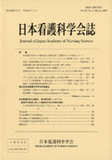Japanese
English
- 販売していません
- Abstract 文献概要
- 参考文献 Reference
- サイト内被引用 Cited by
要旨
本研究の目的は,先天性障害をもつ児に続く妊娠・出産を選んだ女性が,妊娠中から出産を迎えるまでにどのような体験をし,その体験をどのように意味づけているかを記述し理解することである.ダウン症候群の児に続く妊娠・出産を終えた5名の女性に,非構成的面接を実施し,現象学的アプローチを参考に質的記述的に分析した.5名の体験の類型化から以下の点が示された.
女性たちは,ダウン症候群の子どもの出産によって,〈普通の子どもの喪失〉とともに〈自分自身の価値の喪失〉を体験していた.
女性たちは,次回妊娠を〈本来の自分の価値を取り戻す〉,〈普通の育児を体験する〉,〈ダウン症の子どものためにきょうだいをつくる〉機会として意味づけていた.
女性たちは,妊娠する以前にそれぞれに次回の妊娠を意味づけ,〈羊水検査を受けるか否かの構え〉を持っていた.しかし,羊水検査を選択するか否かにかかわらず,実際に妊娠を遂げ,検査に直面することにより,新たに〈葛藤〉や〈揺らぎ〉が体験されていた.女性たちは出産に向けて,“障害児であっても引き受ける”,“神に委ねる”“夫の存在”といった新たな〈拠りどころ〉をそれぞれが見出していた.
ダウン症児に続く出産後,女性たちが得たものとは〈普通の育児を経験できる喜び〉,〈ダウン症の子どもの見方の変化〉,〈自分の価値観の転換〉であった.
Abstract
The purpose of this study was to describe the meaning of women's experiences of subsequent pregnancy and childbirth following delivery of a child with a congenital anomaly. Five women participated in unstructured interviews, after subsequent childbirth following delivery of a child with Down's syndrome. All data were analyzed qualitatively based on phenomenology. The results were as follows: After the delivery of a child with Down's syndrome, each woman experienced not only“not being able to raise a normal child”but also“lowered self-esteem”. They perceived subsequent pregnancy as a chance to: a) regaining their own self-worth, b) raise a normal child, and c) give a sibling to the Down's child. Prior to the subsequent pregnancy, these women had already made their own decisions regarding amniocentesis. However, all women reported in the interviews that they experienced emotional conflict and wavered when they became subsequently pregnancy, and faced anew the issue of amniocentesis. They also reported that they found emotional strength through: “a) their own resolution to accept the child with or without a congenital anomaly, b) their trust in God, and c) the existence of their husband.”After the subsequent childbirth following delivery of a child with Down's syndrome, each woman gained “the joy of caring for a normal child”,“a new perspective on raising the child with Down's syndrome”and“a new outlook on life”.
Copyright © 2003, Japan Academy of Nursing Science. All rights reserved.


